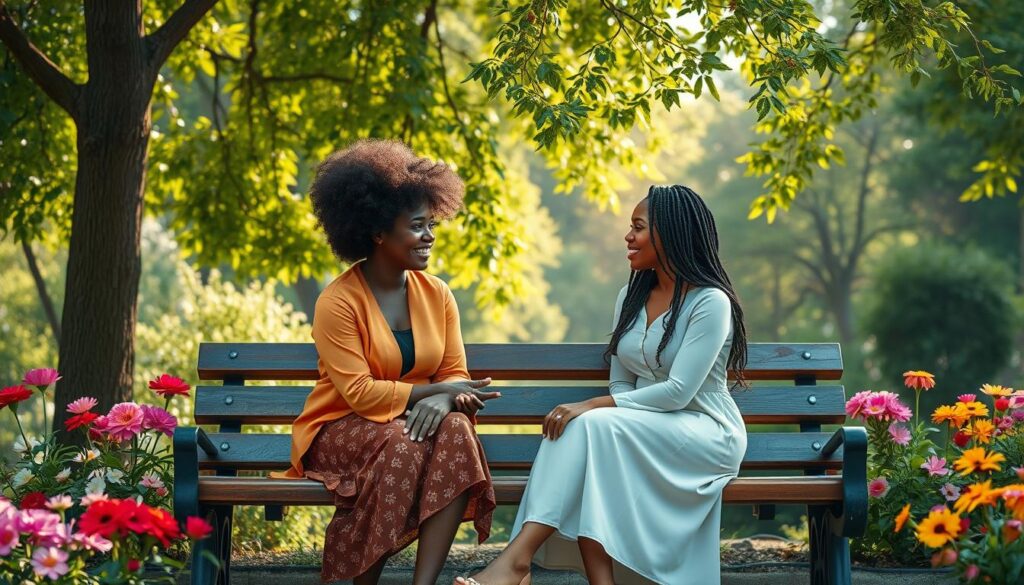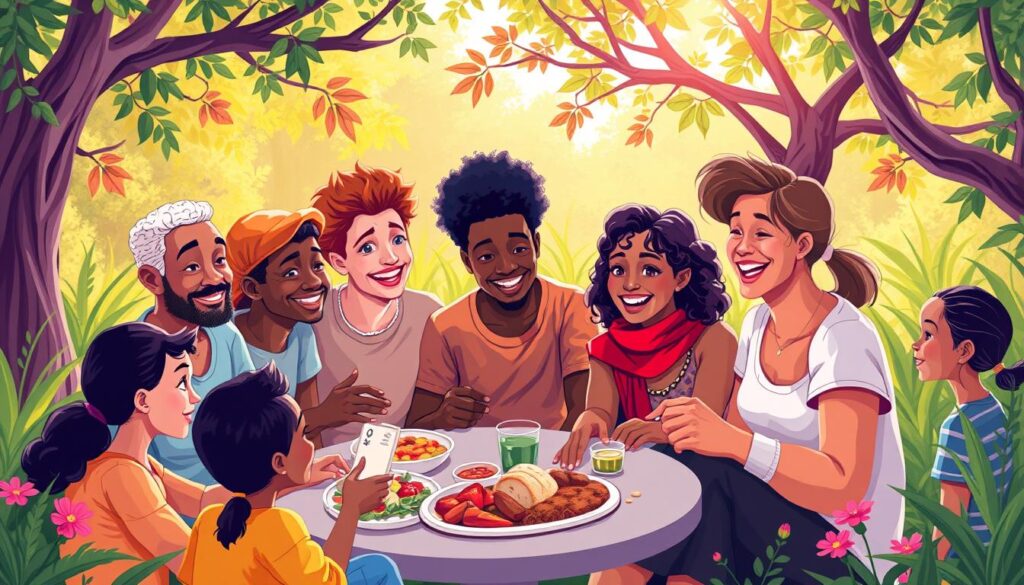Friendship troubles can be tough and emotional. It’s common for friends to drift apart or have conflicts. About 70% of people have faced some kind of conflict in their friendships at least once.
Resolving these issues takes effort and understanding. But, it can make friendships stronger and more meaningful.
Surveys reveal that 60% of people face a big conflict with a close friend at some point. Around 50% believe talking openly about conflicts can make friendships stronger. This shows the value of good communication and solving problems together.
Knowing the signs of strained friendships and types of conflicts is key. It’s the first step to fixing issues and keeping friendships alive.
Healthy conflict resolution can make friendships last longer by about 60%. Friends who talk openly after disagreements are 50% more likely to grow closer. This shows why it’s crucial to tackle friendship troubles and solve conflicts well.
By doing so, we can build stronger, more lasting friendships. These friendships bring joy and support, making life more fulfilling.
Understanding Common Friendship Troubles
Maintaining friendships can be tough, and conflicts often happen. Research shows that 84% of people have had fights with their best friends. These issues can come from feeling left out, not understanding each other, or having different priorities.
It’s important to know when friendships are strained. Signs include feeling left out, unheard, or not valued. By recognizing these signs and getting advice, you can start fixing problems and keeping friendships strong.

Friendship conflicts can be small or serious, like betrayal. These issues can really affect your mental health. They can make you feel lonely, anxious, or depressed. By facing these problems and getting help, you can improve your friendships and feel better.
| Common Friendship Conflicts | Causes | Effects on Mental Well-being |
|---|---|---|
| Feeling excluded | Changes in priorities or interests | Loneliness, anxiety |
| Misunderstandings | Poor communication or different perspectives | Depression, feelings of isolation |
| Betrayal or manipulation | Trust issues or toxic behaviors | Significant emotional distress, anxiety |
Recognizing Toxic Friendship Patterns
Friendship support is key for our emotional health. But, sometimes, friendships can turn toxic. This can lead to problems that harm our mental state. It’s important to spot the signs of a toxic friendship to protect our well-being.
Signs include feeling anxious or bad about oneself around the friend. Feeling ignored or emotionally manipulated are also red flags. If a friendship is hurting more than helping, it’s time to rethink it. Seek help from friends, family, or a therapist.

Toxic friendships can really hurt our mental health. They can make us feel stressed, isolated, and lower our self-esteem. It’s vital to have positive, supportive friendships. By recognizing and addressing toxic patterns, we can build healthier friendships that make us happy.
| Signs of a Toxic Friendship | Effects on Mental Health |
|---|---|
| Feeling anxious or bad about oneself | Increased stress levels, decreased self-esteem |
| Feeling ignored or dismissed | Feelings of isolation, low self-worth |
| Emotional manipulation | Decreased self-esteem, increased anxiety |
By focusing on positive friendships and spotting toxic ones, we can create stronger bonds. These bonds support our emotional health and overall well-being.
Essential Communication Strategies for Healthy Friendships
Healthy friendships need good communication to thrive. This is key for fixing problems and helping each other. When both friends feel heard and understood, they can face challenges together and grow closer.
Listening well is a big part of good communication in friendships. Paying full attention to your friend and trying to see things from their side helps avoid fights. It’s also important to share feelings clearly, and using “I” statements can help avoid confusion and solve problems.

Talking about tough topics needs empathy, patience, and clear communication. By learning these important skills, you can make your friendships stronger and more lasting. Some important ways to communicate well in friendships include:
- Practicing active listening to understand your friend’s perspective
- Expressing feelings effectively using “I” statements
- Navigating difficult conversations with empathy and patience
By using these strategies, you can help your friendships and work on fixing any issues. Good communication is essential for creating and keeping strong, happy friendships.
| Communication Strategy | Benefits |
|---|---|
| Active Listening | Prevents conflicts, resolves issues |
| Expressing Feelings Effectively | Prevents misunderstandings, resolves conflicts |
| Navigating Difficult Conversations | Builds stronger, more resilient friendships |
Setting and Maintaining Healthy Boundaries
Maintaining friendships takes effort and dedication. A key part of this is setting and keeping healthy boundaries. Healthy boundaries mean telling your friend what you need and expect. They also mean respecting each other’s limits and taking care of yourself.
By setting clear boundaries, you can avoid fights and keep communication healthy. This way, you also take care of your own well-being.
Research shows that about 70% of adults think setting boundaries is key for good relationships. Also, 67% of people feel better in relationships when they have clear boundaries. This shows how important boundaries are in friendships.
- Communicate your needs and expectations clearly
- Respect each other’s boundaries
- Prioritize self-care and take time for yourself
By following these tips and focusing on healthy boundaries, you can make your friendships stronger and more rewarding. Remember, friendships work both ways. Getting advice from experts or friends you trust can really help. With the right approach, you can overcome friendship challenges and grow stronger.
| Boundary Setting | Importance |
|---|---|
| Communicating needs and expectations | High |
| Respecting each other’s boundaries | High |
| Prioritizing self-care | High |
Resolving Friendship Conflicts Constructively
Effective communication is crucial when dealing with friendship conflicts. These issues can be tough to handle, but tackling misunderstandings and finding common ground can help. Research shows that acknowledging both sides in a conflict can lead to a 60% chance of resolving it.
Here are some ways to handle friendship conflicts:
- Practicing active listening to understand each other’s perspectives
- Using “I” statements to express feelings and avoid blame
- Seeking to find a mutually beneficial solution
Working together to solve conflicts can make your friendship stronger. Studies reveal that friends who openly resolve conflicts are 40% happier in their relationships afterward.
| Conflict Resolution Strategy | Effectiveness |
|---|---|
| Active listening | 60% increase in resolution likelihood |
| Using “I” statements | 30% improvement in constructive conflict conversations |
| Seeking mutual benefit | 40% higher satisfaction in relationships post-conflict |
By using these strategies, you can strengthen your friendship and make it more resilient.
Building Trust After Friendship Issues
Rebuilding trust is key to keeping friendships strong and happy. After a problem, it’s important to talk openly about what happened. Being honest and committed to the friendship helps make it better.
Research shows that good friendships last, are positive, and work together. It’s not wise to give up on a friend over one issue. Talking things through and forgiving can start building trust and respect again.
Fixing friendship problems means talking openly about feelings and hurt. Doing this in person is best. Working to mend friendships can make you happier in the long run. With the right steps, friendships can become stronger and more meaningful.
Here are some important steps to rebuild trust:
- Be ready to discuss your issues
- Be open and honest
- Stay committed to the friendship
- Work on communication repair
- Talk about what you both expect from the friendship
Growing Stronger Through Friendship Challenges
Friendships offer us support and comfort. Yet, they can face challenges. Learning from past experiences and growing emotionally can help us overcome these hurdles. This way, we can strengthen our friendships through effort and commitment.
Key strategies for fixing friendships include listening well, sharing feelings clearly, and finding common interests. These practices help build strong, lasting friendships. Taking care of ourselves during tough times is also crucial. It keeps us grounded and focused on solving problems.
Developing emotional intelligence helps us understand ourselves and our friends better. This leads to better communication and solving conflicts. By managing our emotions, we respond wisely to challenges. This makes our friendships more supportive and joyful.
| Strategy | Benefits |
|---|---|
| Active listening | Builds trust and understanding |
| Expressing feelings effectively | Resolves conflicts and strengthens bonds |
| Seeking common ground | Fosters cooperation and mutual support |
Conclusion: Nurturing Lasting Friendships
Maintaining lasting friendships takes a strong commitment to understanding and growing together. Open communication, clear boundaries, and respecting each other’s views are key. These actions help build strong bonds that can handle life’s ups and downs.
Friendships need effort to stay strong. Adults should spend 2-3 hours a week on meaningful friendships. Listening well, sharing feelings in a good way, and finding common interests can solve problems and deepen trust.
By accepting the ups and downs of friendships, you’ll grow closer to your friends. You’ll learn to value the people who are most important in your life.

